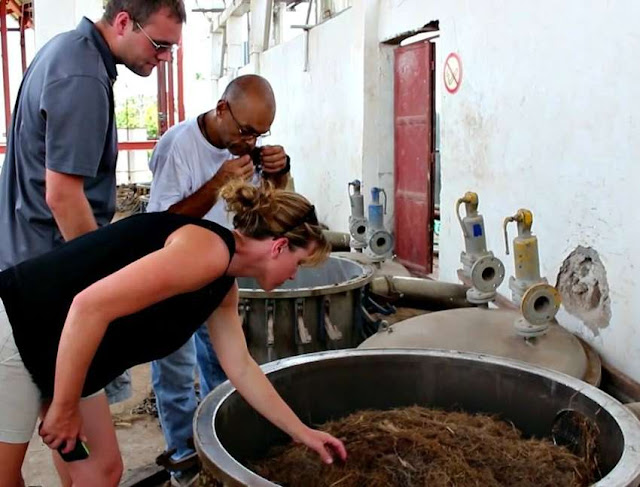Scotch and Soda used to be a good brand. Transparent, sustainable, ethical, inspiring.
But something happened that changed all of that. This is that story.
Where They Were—Scotch & Soda Sustainability Rating 2023
In April 2023, Scotch & Soda earned a Silver rating on our Certified sustainable brand list, scoring 61 out of 100. At the time, they showed strong performance in environmental responsibility and transparency—two key pillars of ethical fashion.
Here’s how they scored across our core categories in 2023:
- Transparency: 14/14
- Fair Labor: 6/33
- Sustainably Made: 41/49
- DEI: 0/4
- Principles: 0
- Total: 61/100 (Silver)
Scotch & Soda stood out for publishing a full list of their Tier 1 and Tier 2 suppliers via Open Supply Hub—an uncommon level of supply chain transparency. They also earned high marks in environmental impact, sharing clear product standards and measurable goals for sustainable materials.
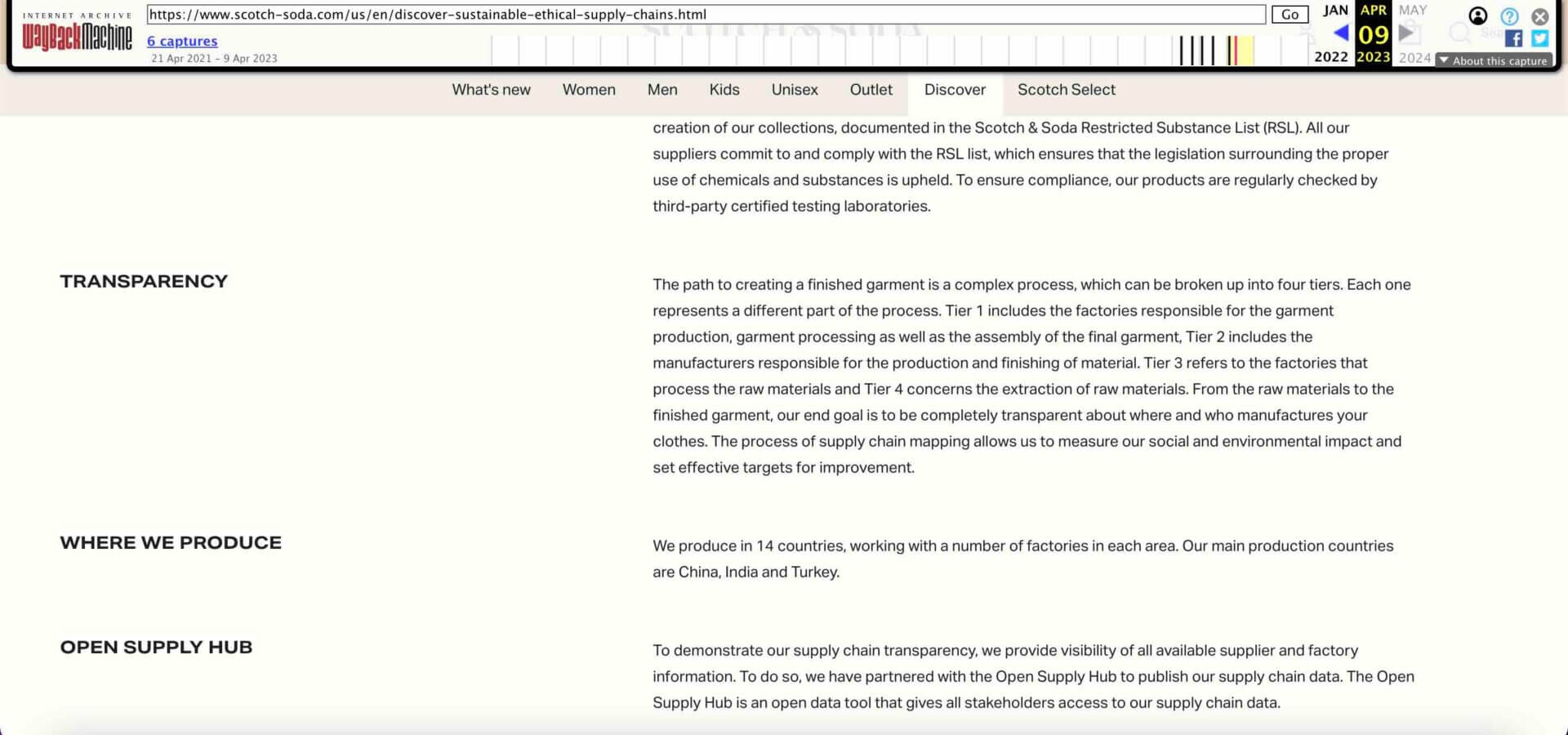
While they had room to grow in labor rights and DEI, the brand was transparent about its priorities and had real, visible sustainability programs in place.
That’s no longer the case.
Where They Are Now—Scotch & Soda Sustainability Rating 2025
Just two years later, Scotch & Soda’s sustainability journey has taken a dramatic turn. In our 2025 re-evaluation, the brand scored –20 out of 100—a complete reversal that lands them in failing territory.
Here’s their 2025 score breakdown:
- Transparency: 0/14
- Fair Labor: 0/33
- Sustainably Made: 0/49
- DEI: 0/4
- Principles Deduction: –20
- Total: –20/100 (Failed)
None of the sustainability programs we previously documented are still publicly available. The brand no longer lists suppliers, doesn’t share sourcing standards or sustainability goals, and provides no insights into labor practices or environmental impact.
This wasn’t a gradual decline—it was a full erasure of accountability.
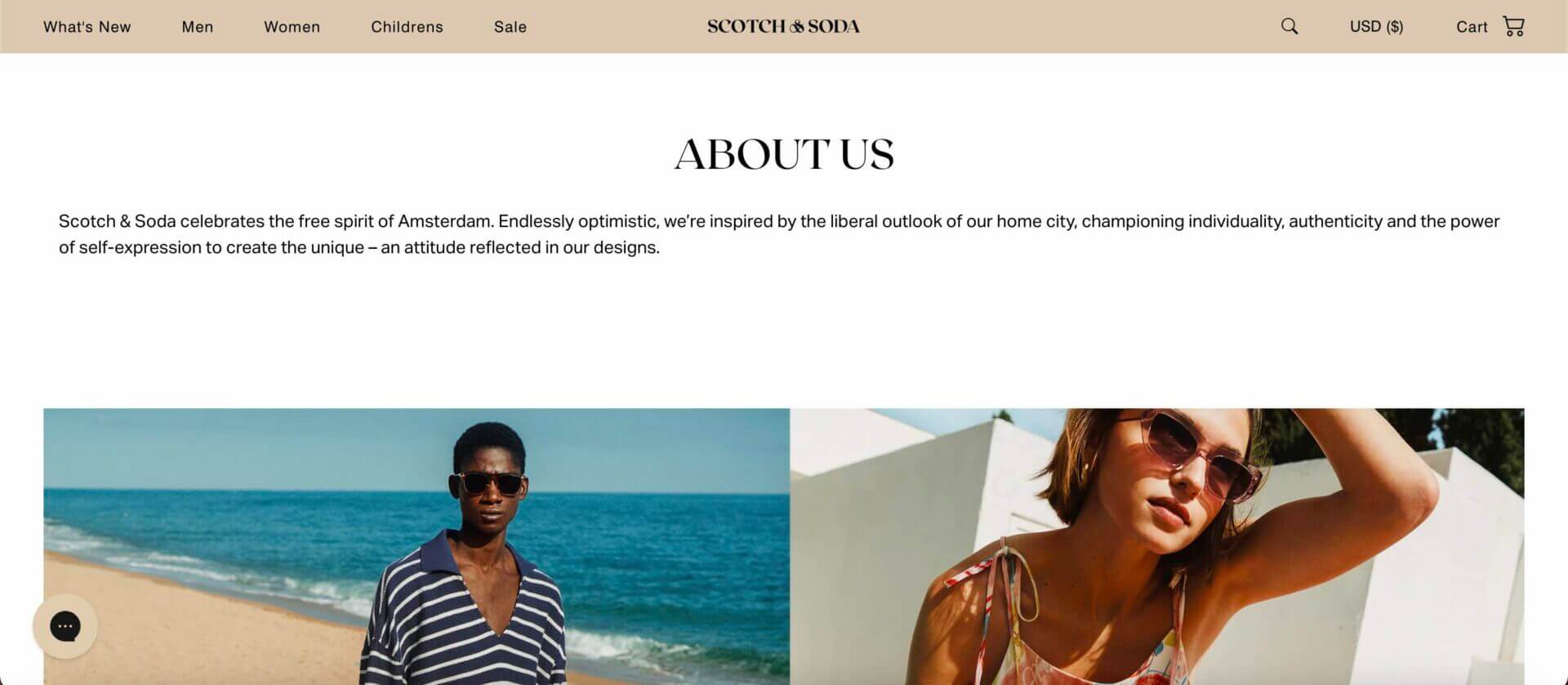
For that reason, Scotch & Soda not only failed to maintain their standing, they triggered our –20 point Principles deduction—a penalty reserved for brands that fall below our baseline standards of trust and transparency.
So how does a brand go from Silver to Failing in just two years?
How Scotch & Soda Went from Silver to Failing
In 2023, Scotch & Soda was doing the work. The brand earned a Silver rating, our second highest tier, by meeting key standards in transparency and environmental sustainability. Their full supplier list was public. Their materials were traceable. And while labor and DEI efforts needed improvement, the building blocks of a sustainable fashion leader were visible.
By 2025, all of that had vanished.
Here’s what changed:
- Transparency: dropped from 14/14 to 0/14
→ The supplier list is gone. No traceability. No material sourcing disclosures. - Fair Labor: dropped from 6/33 to 0/33
→ No information on living wages, worker protections, or factory conditions. - Sustainably Made: dropped from 41/49 to 0/49
→ Previously shared environmental commitments and goals have disappeared. - DEI: remains at 0/4
→ No evidence of progress on equity or inclusion. - Principles: added a –20 point penalty
→ The brand has failed to meet our minimum standards for trust and transparency.
This wasn’t a dip in performance—it was a disappearance of values. Scotch & Soda didn’t just stop progressing; they erased nearly every trace of the sustainability work they were once recognized for.
So… what happened?
Why Scotch & Soda Lost Its Sustainability Certification
The collapse of Scotch & Soda’s sustainability efforts didn’t happen in a vacuum. In 2023, shortly after our last evaluation, the company filed for bankruptcy. Later that year, it was acquired by Bluestar Alliance, a brand management firm known for reviving distressed retail names like Hurley, Bebe, and Brookstone.
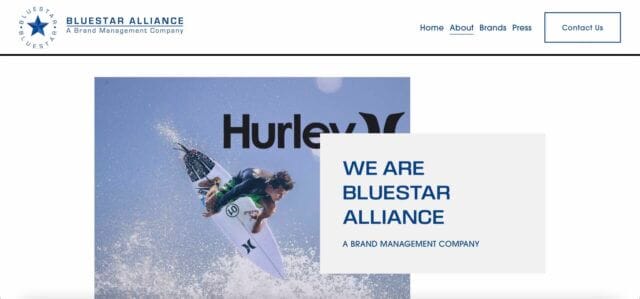
Bluestar’s portfolio focuses on mass-market appeal—not sustainability. None of its other brands are known for ethical sourcing, transparency, or environmental leadership. Since the acquisition, the writing’s been on the wall: Scotch & Soda’s sustainability programs were not part of Bluestar’s future vision.
- The supplier list is gone
- Sustainability goals and reports are gone
- There’s no information about labor practices or environmental impact
This kind of backtracking isn’t just disappointing—it’s a reminder that brand values can disappear with a change in ownership. What was once a promising path toward sustainability has been replaced with silence.
We don’t speculate on internal motives. But we do measure what’s visible. And in 2025, Scotch & Soda’s commitment to ethical fashion is, for all intents and purposes, erased.
Watch our video deep dive to explore why Bluestar deprioritized sustainability, what Scotch & Soda erased, and what it means for conscious consumers.
Our Sustainable Brand Criteria
At Eco-Stylist, we evaluate brands using a framework designed to reflect the real-world impact of their operations—not just their marketing. Our criteria are built to identify brands that are transparent, ethical, and environmentally responsible.
We assess brands across five core pillars:
- Transparency
Do they publicly share supplier information, sourcing standards, and third-party certifications? - Fair Labor
Are workers paid living wages? Are their rights and well-being protected? - Sustainably Made
Are materials responsibly sourced? Does the brand measure and reduce its environmental footprint? - Diversity, Equity & Inclusion (DEI)
Does the brand demonstrate a commitment to equity internally and across its supply chain? - Principles & Accountability
We introduced this category to flag brands that fall below minimum ethical standards. Brands that erase key information or fail to provide basic transparency may receive up to a –20 point penalty. And there’s an additional penalty for fast fashion.
We don’t publish our full scoring file, but we do publicly share a video walkthrough of our criteria so anyone—brands or consumers—can understand how ratings are determined.
Because real sustainability is measurable, traceable, and transparent.
Why We Update Our Ratings
Sustainability in fashion isn’t static—it evolves. And so do brands.
At Eco-Stylist, we don’t believe in “set it and forget it” certifications. A brand’s past performance doesn’t guarantee future integrity. That’s why we routinely revisit our ratings to ensure they reflect what’s happening now—not what used to be true.
Scotch & Soda is a case in point.
In 2023, they earned a Silver rating by meeting several key criteria. But by 2025, nearly every trace of their sustainability efforts had been erased. If we hadn’t updated our rating, they’d still be listed as a trusted brand—and that would be misleading.
We hold ourselves accountable to the same standards we expect from brands. That means making hard calls, removing certifications, and being transparent about those decisions—because that’s what conscious consumers deserve.
If a brand earns your trust, it should work to keep it. And if they stop doing the work, we’ll let you know.
3 Ethical Alternatives to Scotch & Soda
Loved Scotch & Soda’s aesthetic? You’re not alone. If you’re looking for modern, stylish alternatives that also walk the talk on ethics and sustainability, here are three Eco-Stylist Certified brands to explore:
1. Outerknown

Outerknown blends relaxed California style with serious sustainability credentials. Think cozy knitwear, classic button-downs, and effortless staples—all made from organic or recycled materials. They work with Fair Trade Certified™ factories and publish detailed supply chain information.
Read Outerknown’s full brand rating →
2. Dedicated
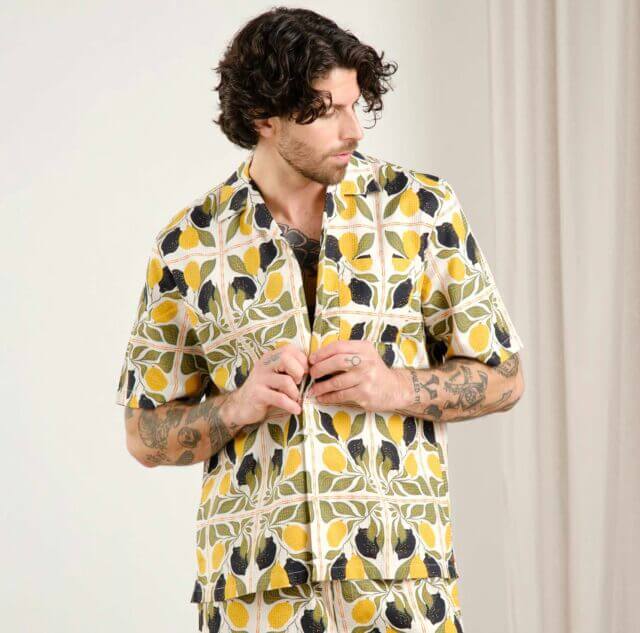
Dedicated is for the bold dresser who values personality and principles. With their colorful prints, gender-neutral fits, and organic cotton fabrics, they’re a stylish and sustainable alternative. They’re Fairtrade certified, PETA-approved vegan, and climate neutral.
Read Dedicated’s full brand rating →
3. Everlane

Everlane’s minimalist, elevated basics are a great style match for Scotch & Soda. They focus on radical transparency—sharing production costs, factory details, and environmental efforts. From cashmere sweaters to tailored trousers, they offer accessible, responsible wardrobe staples.
Read Everlane’s full brand rating →
Why These Brands Stand Out
- Transparent supply chains and third-party certifications
- Commitments to fair labor and living wages
- Measurable environmental targets and climate action
- Circularity initiatives or long-lasting product design
Each of these brands is on our Certified list because they don’t just talk about sustainability—they show up for it.
Sustainability Isn’t a Sticker—It’s a Standard
You care. We do too.
Our job is to help you shop your values without compromise. When a brand like Scotch & Soda backtracks, we’ll tell you. When others do it right, we’ll celebrate them.
Let’s build a more ethical future together.
Find brands that align with your values →
Want more honest updates like this?
Scroll to the footer and sign up for our newsletter to get conscious fashion insights, brand ratings, and ethical shopping tips—delivered to your inbox.

Garik Himebaugh is the founder of Eco-Stylist, the go-to resource to find ethical clothing. He’s also a sustainable personal stylist and international speaker on all things sustainable fashion. Garik loves coffee, climbing, and clothes.


